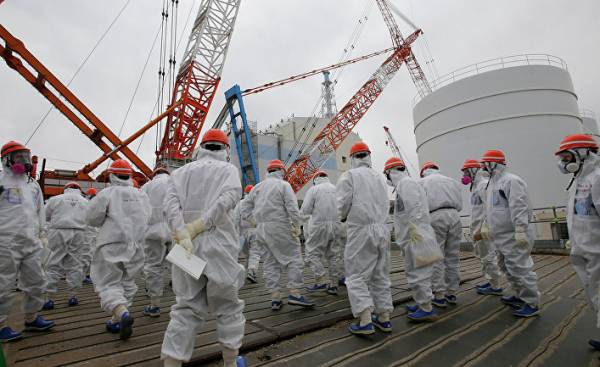
Torn between France and his native Japan, the writer reflects on the changes in the archipelago after the disaster on 11 March 2011. In place of the former fear, apparently, came the strengthening of political control and a return to traditional values, the disappearance of the individual in favor of a strong state.
Writer and translator of Akira Mizubayashi became a curious traveler and avid wanderer. This writer and a music lover feels like home, and in his native Japan and France. The accident in Fukushima became his breaking point. In 2011, the “friendly feeding” of Jean-Bertrand of Pontali (Jean-Bertrand Pontalis) he told about the opening of the continent “experience” in “Came from outside the language”, “the autobiography almost a Frenchman and a full-fledged Japanese,” as he described it, Daniel Pennac (Daniel Pennac). As a true follower of the Enlightenment with its critical eye, today she is considering Mizubayashi six years since the accident March 11, 2011, simultaneously with the publication of “Millennium of love”, a new novel about Japanese who left the country because of attacks on freedom after Fukushima.
Libération: After the disaster on March 11, 2011 it’s been six years. What is she, in your opinion, is a in Japan, and how would you describe what happened since then?
Akira Mizubayashi: March 11 was a turning point in my life. Fukushima revealed to the world the true face of the nuclear monster, shed light on its destructive power and its totally uncontrolled nature. Six years later, that monstrosity is not diminished one iota, although the company Tepco and the authorities are trying to downplay or even hide it. In addition, March 11 is a key date for me because I think differently and look at things after this disaster and the reaction to it. I differently look at my country and how it works. More specifically, the changes affected my relationship to the Japanese language. In 2011 I released my first book in French. March 11 I arrived in Paris for meetings about the book. I still remember what he saw in the Paris airport terrifying footage of the tsunami that swept the land of waves. After the shock of some unknown force pushed me to move away from the Japanese language and to study French. That is, at the level of creativity I switched from Japanese to French.
— Japan: the “man-made disaster”, as mentioned in Japanese parliamentary inquiry, July 2012?
— The most devastating in the history of the earthquake and the resulting nuclear accident occurred when the government was the Democratic party. Prime Minister Naoto Kan realized that we needed to abandon nuclear power and pursue renewable. In December 2012 the liberal democratic party of current Prime Minister Shinzo Abe regained power after a crushing victory in parliamentary elections. This party is in favour of nuclear power and flooded the country, nuclear power plants, in spite of the tremendous sufferings in Hiroshima and Nagasaki. The Japanese gave confidence motion which did not draw conclusions from the disaster. Moreover, it has done everything to erase the memory left by the Fukushima injury. Some Newspapers like “Tokyo Shimbun” conduct real information, but their influence is very weak compared to the devastating impact on the minds of the media, which distract attention from the alarming reality of Fukushima. The current government wants us to live after the accident in denial despite the fact that we have no clear information on the analysis of nuclear power plants, and almost 100 of thousands of displaced persons continue to live in uncertainty. The most serious is the lie of power in its quest to achieve the Olympic games in 2020 in Tokyo. The plant is under full control of the competent authorities, argued the Prime Minister in 2013. Training for the Olympics is progressing, and the authorities carried out a return policy (cancelling instructions to evacuate radioactive zones). Anyone who would vote against holding the Games and shown them to be harmful and deceptive role can declare a traitor, unworthy to be called a Japanese person.
— Writer Michael Ferrier (Ferrier Michaël) was noted in the book “Thoughts from Fukushima,” “vague, but persistent sense that the disaster little has changed in France and in Japan.” The significance of this disaster and the danger of the destruction were forgotten, diminished and pushed to hell?
Yes, Fukushima is moving away, disappears from sight. The risk of destruction of the country (such a prospect at one time with horror considered Naoto Kan) is deleted. Michael Ferrier was right in saying that the disaster little has changed. Japan is a country that can not shake, even a disaster on the scale of Fukushima. Of course, there were rallies and demonstrations. But the country was not able to start a national debate on the nuclear issue. Rather, it went the opposite path, the path of militarization, which sooner or later will raise the question of the possession of nuclear weapons. All this happens with the submission of the head of the government, which has formed since 2012, the authoritarian regime and is going to amend the Constitution to form a national army instead of the current national self-defense forces. As you know, peaceful nuclear technology are closely associated with the military. That is why the liberal democratic party did not want to abandon the peaceful atom. It allows to maintain in force the dream of nuclear power.
Japanese people twice expressed support for Abe, who constantly repeats a favorite slogan: “Get out of the postwar regime.” This means to bury the Constitution of 1947, which is the successor of the Declaration of human rights of 1789 and the Foundation of postwar Japanese democracy. It means back in the days of the Empire, or even of the Edo Shogunate (1600-1868), when the common people had only to obey the orders of the shogun. The indifference of the people, his innate conformism and a tendency to subordinate all of this leads to the fact that Japan was ready to end the democratic experience. How did it come to this? The same question can be asked about Fukushima. I think Fukushima has become a symbol of the degradation of politics. Attempts to erase her from memory become a part of since then of course.
“The indifference of the people, his innate conformism, the tendency to subordinate”. These hard words close to what you write in “the Praise of wandering”. Japanese society is still driven by “community collectivism”, which prevents the emergence of a critical and responsible individuals?
— The origins of the “Praise of wandering” are my questions about Fukushima. And today I don’t see any reason to change something in written. Political degradation already underway. Before our eyes the irrefutable proof that 70 years of “democratic” experience of serious changes has not occurred: the Japanese support the government with the constitutional project of the society in which fundamental freedoms are sacrificed to the highest state interests. I don’t know about you, but I tried not to use the word “people” and “citizens”. They are the legacy of the philosophical tradition of Europe of the XVII and XVIII centuries and completely inapplicable in Japan. The basis of the European concept of policy is based on the theory of the social contract, which considers the people as a result of a General decision, act, Association, transition individuals from the state set in the condition of the people. At the same time in the Japanese concept of policy, i.e. the principle of uniting people in society, is nothing like that. If the European concept of voluntaristic, Japanese — naturalistic. Society does not create people of their common will. This is a inviolable nature with mountains and rivers, which has always been a country and was preceded by the intervention of people. Of course, don’t underestimate the distracting effects of globalized capitalism and all of its amenities. And yet it seems to me that the indifference of the Japanese people is rooted in this attitude to the society as a political Association, but as a kind of natural Givens. In Japan there are no people and, as a consequence, citizens. Probably, the reason.
— Anyway, a group of residents, activists and MPs facing protests against restarting reactors. One of the consequences of Fukushima and a sign of the civil lift in Japan?
— I don’t think. In history there have always been uprisings and rebellions, the protest movement. Just remember that now occurs in Okinawa around the construction of a U.S. military base. The efforts of these people is not enough for the formation of public opinion, which could change management decisions. We are prisoners of vertically aligned companies. We are not interested in the problems of others. Because it is difficult for us to relate to them. People steeped in indifference. This is what I call a structural indifference. Everyone felt part of the sovereign people, became a citizen. However, such awareness there is one major obstacle: the Japanese language. In its very structure is something that does not allow people to unite horizontally. The vertical structure of society exists due to the imposed linguistic practices. I feel the need to reach the basics of what is man as a speaking and political being. So I switched from Japanese to French. Write in French means to escape from the Japanese and created a world where speaking in front of are restrictions of co-existence, which is seriously hindering the emergence of nation and citizen.







